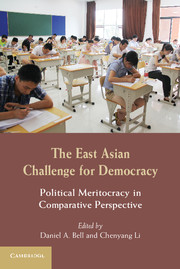Book contents
- Frontmatter
- Dedication
- Contents
- Contributing Authors
- Acknowledgments
- Introduction
- Section I The Theory of Political Meritocracy
- 1 Political Meritocracy and Meritorious Rule
- 2 A Confucian Version of Hybrid Regime
- 3 Confucian Meritocracy for Contemporary China
- 4 The Liberal Critique of Democracy
- 5 Meritocratic Representation
- Section II The History of Political Meritocracy
- Section III Realizing Political Meritocracy Today
- Index
- References
3 - Confucian Meritocracy for Contemporary China
Published online by Cambridge University Press: 05 June 2014
- Frontmatter
- Dedication
- Contents
- Contributing Authors
- Acknowledgments
- Introduction
- Section I The Theory of Political Meritocracy
- 1 Political Meritocracy and Meritorious Rule
- 2 A Confucian Version of Hybrid Regime
- 3 Confucian Meritocracy for Contemporary China
- 4 The Liberal Critique of Democracy
- 5 Meritocratic Representation
- Section II The History of Political Meritocracy
- Section III Realizing Political Meritocracy Today
- Index
- References
Summary
INTRODUCTION
Confucian moral and political thought concentrates on the cultivation of virtue (xiushen) by individuals and the rule of virtue (dezhi) in government. It emphasizes that every individual learn the virtues (such as xiao, ren, yi, zhi, xin, zhong, and he) by observing rituals (li) (i.e., a series of familial and social norms, ceremonies and patterns) affirmed by the tradition. In this tradition, only virtuous individuals deserve to be selected as rulers, and they will rule the people through rituals as well as other virtuous means, using coercion or punishment only as a last resort. In the Confucian view, rulers, as individuals, should strive to become outstanding exemplars of the good life for the people to follow. Government must be appropriately institutionalized to formulate proper policies and conduct suitable administrations to promote people's well-being. Accordingly, although the Confucian view of government can fit into the formal definition of political meritocracy that this book generally adopts – namely, a government by those with above-average ability or virtue along with a selection mechanism designed to choose them – it also goes deeply beyond it. A good Confucian polity inevitably involves substantive Confucian moral and political norms that provide specific guidance as to how rulers should rule. Without engaging such norms, it is impossible to offer an adequate account of Confucian meritocracy, because they are at least needed to inform what “merit” is precisely for a Confucian meritocracy. Such norms, for this book's concern with sorting out various political arrangements for legitimate legislature and governance, are also needed to distinguish the Confucian form of meritocracy from other forms, such as liberal meritocracy, because they are undeniably different.
- Type
- Chapter
- Information
- The East Asian Challenge for DemocracyPolitical Meritocracy in Comparative Perspective, pp. 88 - 115Publisher: Cambridge University PressPrint publication year: 2013
References
- 11
- Cited by



